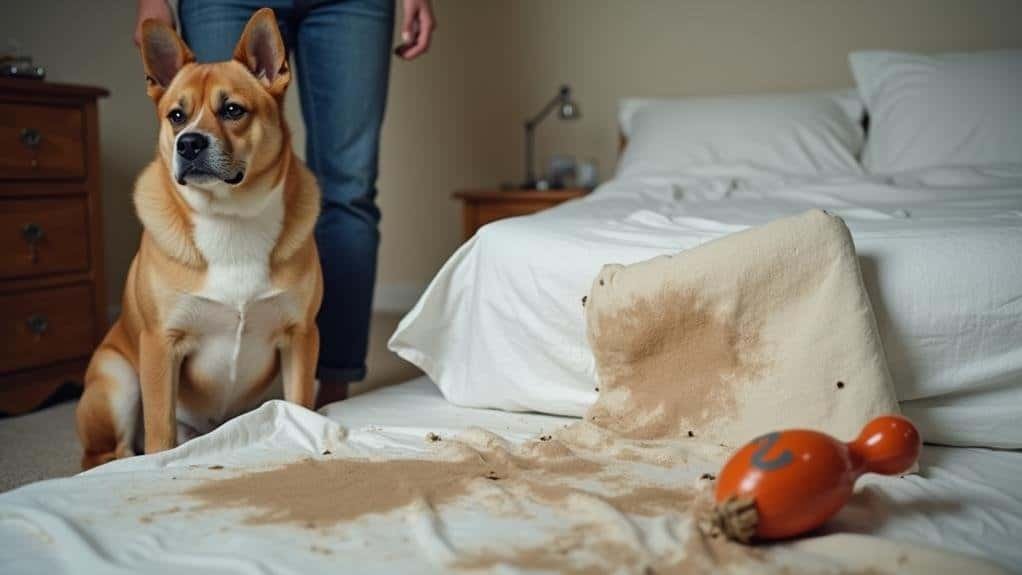Dogs may pee on beds for various reasons, including age-related issues, territorial marking, medical conditions, anxiety, and training gaps. Puppies and senior dogs often struggle with bladder control, while some dogs mark beds to assert dominance. Urinary tract infections and other health problems can cause involuntary urination. Anxiety, stress, or changes in the environment may also trigger this behavior. Incomplete house-training or inconsistent routines can lead to confusion about appropriate elimination spots. To address this issue, you'll need to identify the underlying cause and implement targeted strategies. Understanding these factors is key to solving this frustrating problem and restoring harmony in your home.
Age-Related Accidents and Confusion

When it comes to dogs peeing on beds, age plays a significant role in many cases. Young dogs, especially puppies, are still learning the ropes of potty training and may not fully understand where they should relieve themselves. This lack of knowledge can lead to accidents on your bed, as it's a familiar and comfortable spot for them.
On the other hand, senior dogs face their own set of challenges. Incontinence becomes more common as dogs age, causing them to dribble urine while sleeping or resting on your bed. Additionally, cognitive decline in older dogs can lead to confusion and a loss of previously learned potty-training habits, making them more prone to accidents.
Both young and senior dogs may struggle with bladder control, resulting in unexpected urination in familiar spaces like beds.
It's important to remember that these accidents aren't deliberate acts of disobedience but rather a result of age-related issues. In some cases, emotional issues or submissive behavior may also contribute to this problem.
Understanding these age-related factors can help you address the issue more effectively and compassionately.
Territorial Marking Behavior
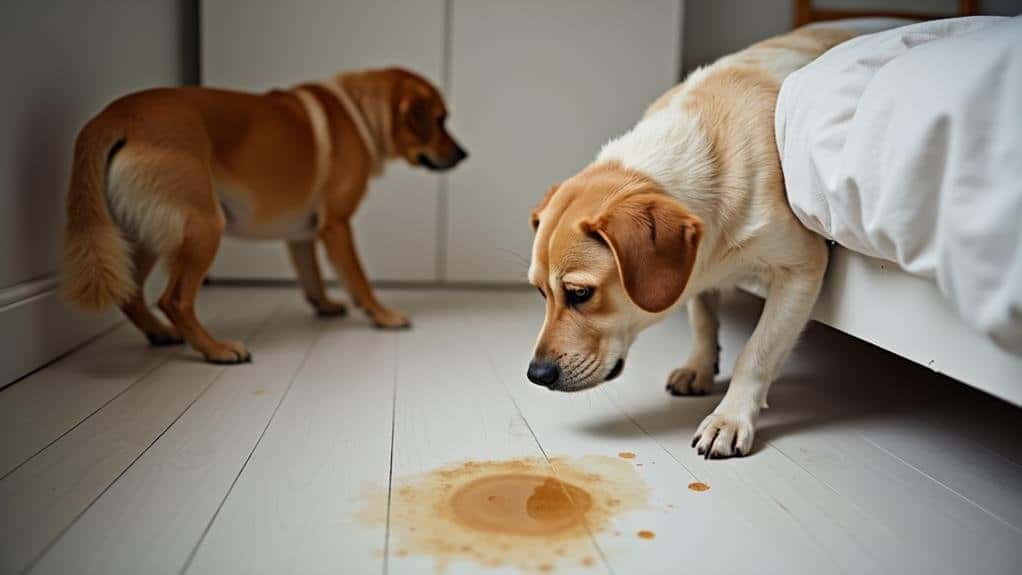
While age-related issues can lead to bed-wetting, another common reason for dogs peeing on beds is territorial marking behavior. This instinctive behavior involves dogs depositing small amounts of urine on beds to communicate their presence and assert dominance in the space.
It's not a sign of poor house-training but rather a natural way for dogs to leave their "signature" in the environment.
You're more likely to see this behavior in intact males and adolescent dogs, who are prone to marking. Your dog may choose your bed for marking because it's saturated with your scent, which they associate with comfort and familiarity.
It's like leaving graffiti for other dogs, conveying information rather than claiming ownership.
Environmental changes can trigger this behavior. If you've introduced new pets or people to your home, your dog might respond by marking your bed out of insecurity or perceived competition.
Remember, this isn't a spiteful act but a way for your dog to cope with changes in their environment.
Understanding the root cause of this territorial marking behavior can help you address it effectively and maintain a harmonious relationship with your furry friend.
Medical Conditions and Urinary Issues
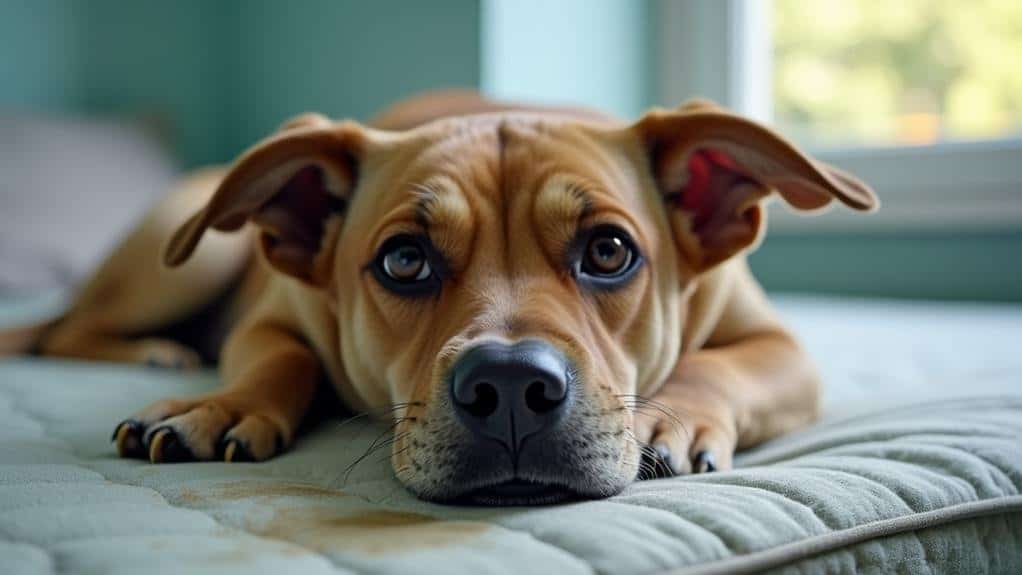
Medical conditions and urinary issues often lurk behind a dog's bed-wetting behavior. If your furry friend is suddenly peeing on your bed, it's vital to take into account underlying health issues that may be causing this problem.
Urinary tract infections (UTIs) are a common culprit, leading to frequent urination and accidents on beds due to increased urgency.
Other medical conditions like bladder stones and cystitis can create discomfort, resulting in involuntary urination, even while your dog sleeps.
As dogs age, they may develop urinary incontinence due to weakened bladder muscles, causing them to dribble or pee on beds during rest.
Hormonal imbalances, such as those associated with diabetes or Cushing's disease, can greatly impact your dog's urinary function, leading to inappropriate urination.
To address these issues, it's important to schedule regular veterinary check-ups, including urinalysis.
These examinations can help diagnose and treat underlying health problems contributing to your dog's bed-wetting behavior.
Anxiety and Emotional Distress
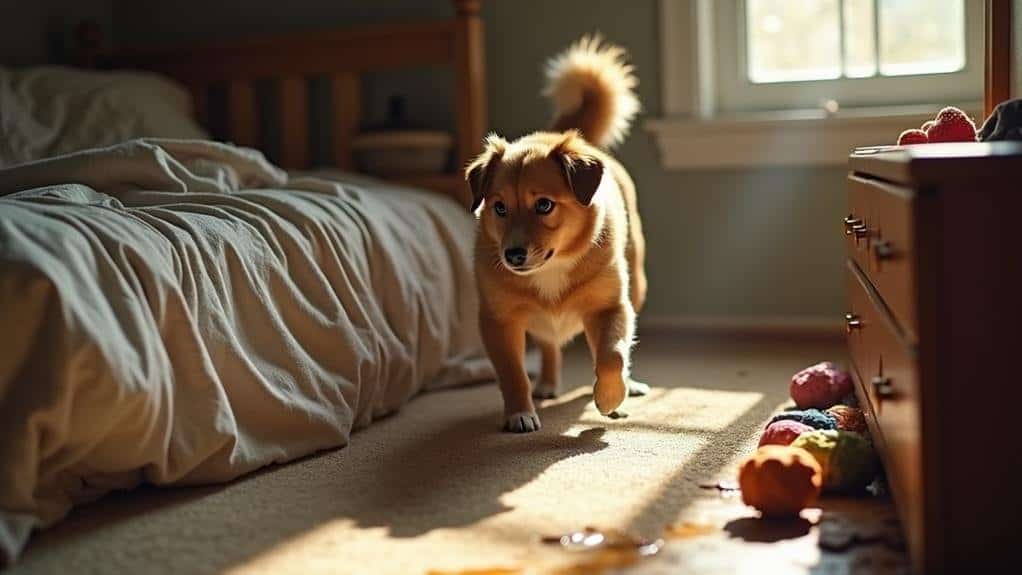
Anxiety and emotional distress can drive dogs to seek comfort in familiar places, often leading to unexpected accidents on your bed. Your dog may pee on your bed due to various emotional triggers, such as loud noises or separation anxiety.
When faced with stressful situations, dogs often retreat to safe spaces like beds, where they feel secure but may still lose bladder control. Anxious dogs are particularly susceptible to urinary issues in these circumstances.
Here are four common scenarios that can cause your dog to pee on your bed:
- Fireworks or thunderstorms startling your pet
- Separation anxiety when left alone
- Anticipation of being left alone due to predictable departure cues
- General stress or emotional distress
Understanding these triggers is essential for addressing the problem. While medical conditions can contribute to urinary issues, anxiety and emotional distress are significant factors in bed-wetting incidents.
To prevent these accidents, focus on reducing your dog's stress levels through proper training and creating a calm environment. Additionally, addressing underlying health conditions and managing separation anxiety can help minimize bed-wetting occurrences, ensuring both you and your anxious dog enjoy a clean, comfortable sleeping space.
Training Gaps and Housebreaking Challenges
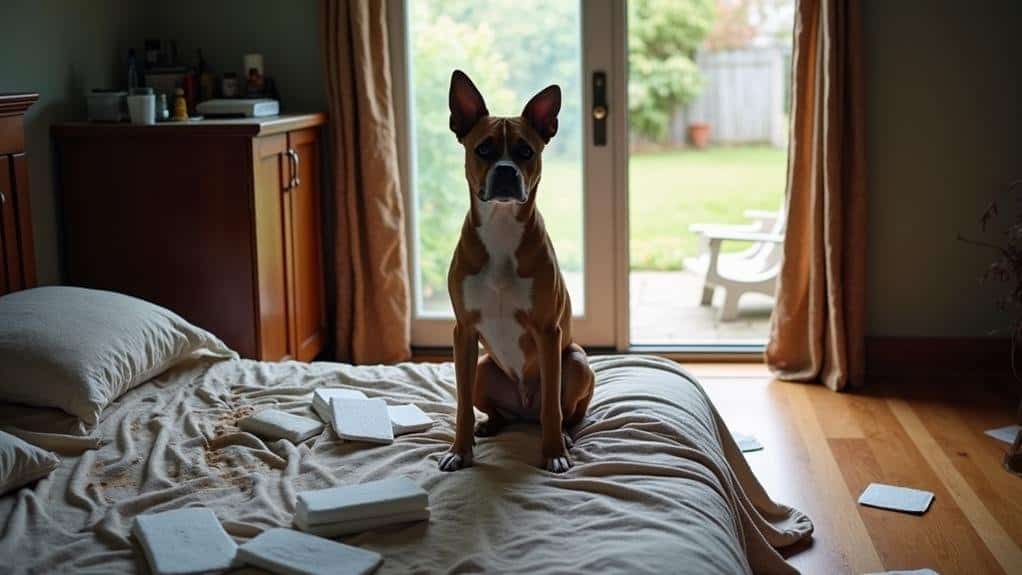
Stemming from incomplete or inconsistent training, housebreaking challenges can lead to unwanted accidents on your bed. Young puppies, in particular, often struggle to understand appropriate potty locations, resulting in accidents during the critical housebreaking phase.
If you're not providing consistent training methods or routines, you're creating confusion for your dog, making it difficult for them to learn where they should relieve themselves.
Training gaps can persist even as your dog grows older. Without proper reinforcement of bathroom training, dogs may revert to inappropriate urination behaviors, especially if they feel neglected.
Lack of supervision during early potty training stages can also lead to dogs choosing soft surfaces like beds as makeshift bathrooms.
To address these issues, focus on positive reinforcement and structured potty breaks. Consistently reward your dog for using designated areas and maintain a regular schedule for bathroom trips.
Increase supervision during training periods to prevent indoor accidents and redirect your dog to appropriate spots. By closing these training gaps and addressing housebreaking challenges head-on, you'll greatly reduce the likelihood of finding unwelcome surprises on your bed.
Environmental Changes and Stressors
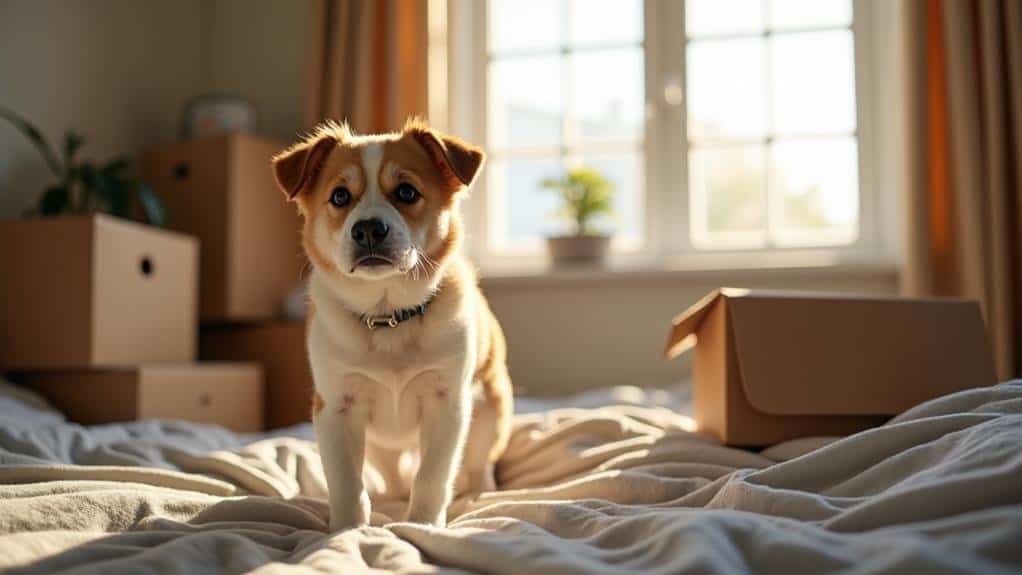
A dog's world can be turned upside down by environmental changes, often leading to stress-induced accidents on your bed. Your furry friend may experience anxiety when faced with unfamiliar situations, resulting in inappropriate urination.
Common stressors that can trigger this behavior include:
- Moving to a new home
- Introducing new pets or family members
- Changes in daily routines
- Loud noises or unfamiliar visitors
When confronted with these challenges, dogs may seek comfort in familiar spaces like your bed. Unfortunately, this can lead to accidents due to loss of bladder control.
Additionally, the presence of strong human scents on beds can prompt dogs to mark their territory, especially during periods of heightened stress.
In multi-pet households, changes in dynamics can create competition for resources, potentially leading to stress-induced marking behaviors on shared spaces.
To address these issues, it's essential to create a stable and calm living space for your dog. Monitor and address environmental stressors to reduce anxiety-related urination.
Prevention and Corrective Strategies
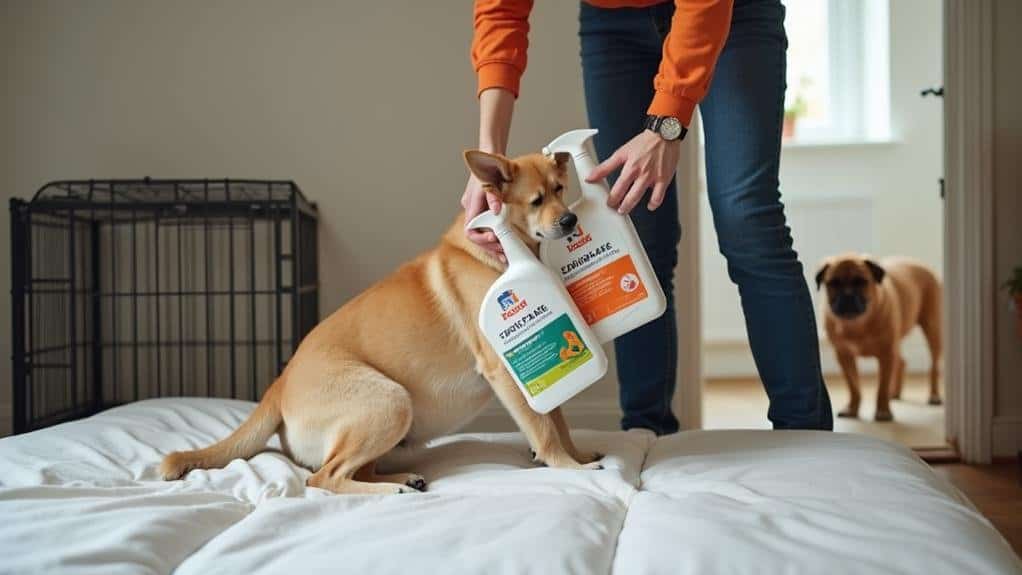
To effectively address and prevent your dog's bed-peeing behavior, you'll need to implement a combination of management techniques and positive reinforcement strategies.
Start by thoroughly cleaning any areas where your dog has urinated using enzymatic cleaners to eliminate lingering scents that might encourage repeat behavior.
Reinforce consistent potty training by taking your dog outside after meals and rewarding them for successful urination in designated spots.
Implement a regular outdoor bathroom schedule to guarantee your dog has frequent opportunities to relieve themselves throughout the day. This will help prevent accidents and reinforce proper house training habits.
Limit your dog's access to beds when unsupervised by using gates, pens, or crates. This management technique can prevent accidents while you work on addressing the underlying causes of the behavior.
If your dog continues to have issues with peeing on beds despite these efforts, it's vital to seek professional help from trainers or behaviorists. They can provide tailored strategies for your dog's specific needs and rule out potential medical issues like urinary tract infections.
Frequently Asked Questions
Why Did My Dog Purposely Pee on My Bed?
Your dog might've peed on your bed for several reasons. It could be scent marking, anxiety, health issues like UTIs, confusion during potty training, or territorial behavior. Consider recent changes and your dog's age to pinpoint the cause.
How to Stop Dogs Peeing on Their Bed?
You'll need to clean bedding thoroughly, establish a consistent potty routine, and limit bed access. Interrupt accidents calmly, redirect to proper spots, and reward good behavior. Consult a vet to rule out health issues if the problem persists.
Should I Punish My Dog for Peeing in My Bed?
No, you shouldn't punish your dog for peeing in your bed. It's ineffective and can worsen the problem. Instead, focus on positive reinforcement, address underlying causes, and consult a vet or trainer for proper guidance and solutions.
Why Do Dogs Poop and Pee on Owners Bed?
Your dog may poop and pee on your bed due to comfort, territorial marking, or emotional triggers. It could also stem from medical issues or lack of bladder control in puppies. Don't ignore this behavior; address it promptly.
Conclusion
You've now learned the various reasons why dogs might pee on beds. Remember, it's not about spite or revenge. Whether it's medical issues, anxiety, or training gaps, there's always an underlying cause. Don't punish your pup; instead, address the root problem. With patience, consistency, and possibly professional help, you can overcome this challenging behavior. Keep your bed clean, your dog healthy, and your bond strong as you work through this issue together.

